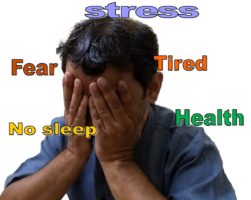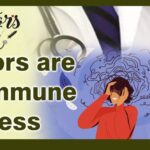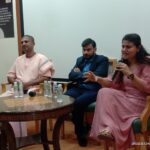De-stress the stress! It is highly important to take care of our psychological health along with our physical health. Body and mind goes and-in-hand and affect each other. So, let’s take steps to control our life before the illnesses takes control of it! To lead a healthy happy life “De-stress the stress!”
“The basic root of happiness lies in our minds; outer circumstances are nothing more than adverse or favourable.” – Matthieu Ricard


A school going kid may have stress handling different subjects and parents may be juggling with mid-life crisis while the old aged people might be going through another set of stressful situations. No one is pardoned from the clutches of stress, but it can be dealt well by using different strategies. The word “stress” is many a times casually used between the conversations of layman, but, the clinical aspect of stress is something that is very serious which is why everybody should know to manage stress well and not allow the stress to manage them!
What is stress ?
Stress is nothing but an emotional experience that is accompanied by predictable physiological, biochemical, cognitive and psychological changes aimed at either adapting to or altering the situation. When faced with any tough situation, we either fight the situation or fly from the situation. The situation however triggers stress based on the resources we have. If we have resources to handle the problem, then we are less stressed. But, if we have less resources to handle, then we are more stressed. The formula is very simple, higher the resources, lower is the stress.
Maybe, sometimes you might have wondered, why certain things trigger stress, yet you enjoy doing that work! Yes, stress is of two types – one that triggers stress and happiness at the same time and the other, that triggers tension/pain along with stress. The first is called Eustress and the second is called Distress. Some family gatherings, parties can be examples of eustress and accidents or death of loved ones can be the examples of distress. Eustress or positive stress, does not harm our body and mind as much as the distress does. Thus, the distress must be kept under control.
Some stress tends to reduce quickly, where as situations like untimely death of loved one, rape or accidents can take more time to leave the person. This prolonged stress can lead to chronic stress related disorders like PTSD (Post Traumatic Stress Disorder). PTSD results from severely traumatic events whose residual effects remain with the individual for years. Chronic stress in early life can trigger an array of health disorders in the life of an individual. The studies have shown a strong relationship between stress and cardiac diseases and lifestyle disorders. Thus, it is imperative to deal efficiently with stress in order not to be a victim of it.
Understanding the effects and knowing some of the physiological effects of stress can help us in managing stress better. Head ache, neck pain, stomach ulcers leading to acute gastritis, back pain etc. are some of the basic physiological effects. One needs to be highly sensitive in understanding these symptoms as they are the initial effects one gets to notice. If these symptoms remain for longer periods, it can cause hypertension, diabetes, thyroid, cardiac slowdown or diseases, vertigo and in many cases, it can worsen the conditions if the individual is already experiencing chronic illness. Thus, it is very important to cope and manage day-to-day stress.
Coping with stress:
Coping with the stress is nothing but the process of managing the extreme effects of stressful situations in the right way to accommodate into the required behaviour. It includes both psychological moderation and action oriented moderation. One needs to make up his/her mind along with thinking appropriately to tackle the situation. Very firstly, it is important to understand the personality of the individual. All individuals are predisposed to certain kinds of situations throughout their life which might have left them with many lasting impressions.
Usually, coping depends on the type of personality of the person because, if the person is strong and practical, they tend to get over their stressors soon enough while compared to the person who is sensitive and very inclusive. It also depends on the locus of control, if the person is self blaming (internal locus of control), then he/she might need different coping strategies. If the person blames others, objects or situation (external locus of control), then they will need different kind of strategies. The personality of a person is directly related to his or her psychological dimension.
Some personality types are more prone to negative affectivity, which means that this personality type people have more chances of getting into anxiety, depression and hostility. Thus, we need to understand that, there are different components and dimensions in understanding personality which helps in offering right strategies to the victim. Type A personality can be helped with more social gatherings and outings whereas, type B people need to be given their space to think and rest. Books can be their best friend, but however, since they don’t open up fast, they need to be observed for their actions.
Second style of coping can be by inducing optimism – positive thinking and cognitive restructuring. Optimism is a concept of thinking, talking and motivating with positive situations around. It is a process of inducing positivity into the person to feel good about what he or she is doing. Stress can be reduced or coped better by thinking and understanding a situation in a more positive way then keeping it negative. However, this coping style cannot be applied in all situations but, might help the most if the case needs cognitive restructuring.
Seeking social support or information is yet another way of coping. Sharing the stress or venting it out is another coping method. It is called catharsis. We need to remember that, when pain is shared, it reduces and when happiness is shared, it doubles. Thus, sharing with a friend, family member, doctor, psychologist or counsellor or anybody, the one is comfortable with is another coping style. It helps us in venting all built in tension that has been bottled up inside us.
Some of the other coping methods include boosting one’s self confidence and helping them to restore trust in themselves. First step is to boost or build self confidence of the victim because, with this step, it is very hard to get an individual out of a stressful situation. One cannot achieve anything if they can’t trust their own self. Alongside of self confidence, self esteem and conscientiousness must be instilled which promotes better coping skills in an individual in stress.
Motivation:
Apart from the above, motivation, rewards or acknowledgements in different forms can help a person come out of stress in a much better way. It is not only these individual characteristics, there are some well built styles that can be followed based on the situation and event.
One such style is the “avoidance v/s confrontation style” which tells us to avoid the stressful situation whenever possible. But, this can be done only when we can see the upcoming stressor. Trying to avoid it or preparing when we are expecting a stressor, can help in handling the situation better. Or the other way, is being bold and confronting the problems we encounter. Facing the problem is a tough job and it can be done when we have resources ready to face. Thus, depending on the situation, stress can be managed either by avoiding or confronting.
“Problem focused v/s emotion focused style” is where, the problem needs to be analyzed first along with the client’s personality. Depending on the case, it can be decided if problem needs to be focused first or the emotion needs to be focused first. For example, if the person has had strained relationships with colleagues, then his interpersonal skills need to be altered. In this case, problem needs to be focused first which will automatically controls the emotion. Or in case of a death of loved one, emotion needs to be focused than the problem. When emotion is focused, it will automatically solve the problem.
One other method is through relaxation training and physical exercises like meditation, mindfulness, yoga, aerobics, zumba etc. Many a times, a very busy life, too many deadlines, mixed roles in life can become highly stressful. There is no escape from such situations and thus, in such cases, the actions need to be organized and the mind has to be kept free. Relaxation trainings like meditation can help in keep the mind calm and regulating emotions whereas, mindfulness helps in organizing and structuring our actions in an unbiased way.
Physical exercises use a lot of energy and helps the body consume more oxygen. When there is more oxygen in the body, blood circulation will be enhanced. The brain tends to receive better circulation thereby allowing it to function better. In this way, the brain can think better in more innovative and creative way. This process of organizing and being able to arrive at better solutions can lower the stress easily. Thus, it is one of the important methods to bring down stress.
Note: However, if self management or peer help does not help in managing stress, it is highly recommended that the individual sees a psychologist. Long term stress can cause diabetes, cancer, thyroid, vertigo, gastritis and many more. It can affect the brain in the late adulthood with neurological disorders like Alzheimer’s. In cases of patients who are already going through these disorders, stress can worsen their conditions.


Ms. Soumya R R
Doctorate student, Industrial psychology, Career Point University, Kota, Rajasthan
sonaravishanker@gmail.com











